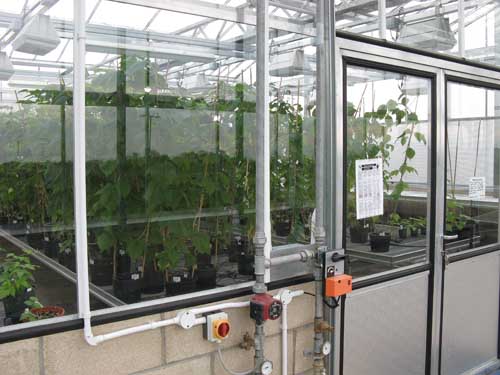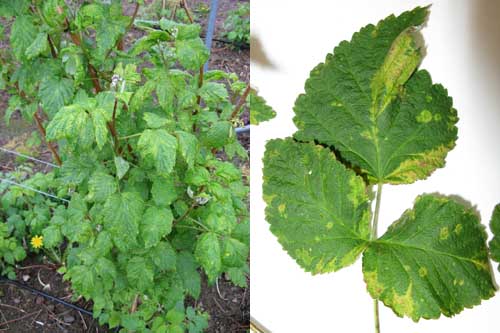Systems And Procedures For Pathogen Testing Of Soft Fruit Nuclear Stock Collections And Plants In Quarantine
Published on 17 February 2010 in Sustainability and Communities

Introduction
SCRI is a world-leading centre for soft fruit research and breeding, with 75% of global raspberry production using cultivars developed at SCRI, and with SCRI blackcurrant cultivars occupying over 95% of the UK cropping area and around 50% of the global area.
Currently, SCRI maintains more than 100 pathogen-tested nuclear stock cultivars and selections of Rubus and over 40 accessions of Ribes. In addition to these plants, we also maintain one of the largest germplasm collections in the world with plants maintained under glass and also in the field. The Rubus and Ribes nuclear stock collections are maintained in a ‘state of the art’ facility. Each glasshouse cubicle has a computerised environmental management system controlling heating, venting, supplementary lighting, photoperiod, shading, and automated irrigation. This facility is unrivalled in the UK.
New material imported into the UK is kept in a separate, quarantine facility at SCRI, which is inspected annually by SASA, and the material is only released after full pathogen testing. Because of these facilities and stringent operating systems, we have attained accreditation with New Zealand for fast track import of Ribes enabling an exchange of parental material for the Ribes breeding programme at SCRI and also for the breeding programme funded by HortResearch in New Zealand. Commercial testing of plants, through the Fruit Health website, provides an important service for Scottish, UK and worldwide growers and propagators.
Key Points
Soft fruit production in Scotland (primarily raspberry, strawberry, blackcurrant and, more recently, blueberry) represents a very valuable sector within the agricultural/horticultural landscape, occupying a total of 1860 ha in 2008, of which around 810 ha were raspberries (Rubus) and blackcurrants.
In the UK, fresh fruit alone accounts for a market of close to £4 billion, and soft fruit/berries account for 16.5% of this total. In the season 2007/2008, 13,400 tonnes of raspberries were produced with a value of just over £94 million, as well as £196 million of strawberries and £12 million of blackcurrants. Blueberry is currently a minor player in the UK but already with a value of £95 million, and demand for the UK grown fruit and the area planted are both increasing dramatically.
The value of these crops in Scotland is around £12 m annually for raspberry and around £0.79 m for blackcurrant, although the latter value rises to an added value of over £200 m within the UK blackcurrant processing crop.
Perennial fruit crops that are grown in the field over successive seasons become increasingly infected with a variety of pests and pathogens, and this reduces their productivity and lifespan. Therefore, to maximise yields and keep crop losses due to infection as low as possible it is essential that growers can re-stock their plantations with certified, pathogen-free planting material.
SCRI is the sole UK establishment with the expertise and facilities to produce pathogen tested Rubus and Ribes nuclear stock plants that are the starting (Foundation grade) material for the UK Plant Health Certification Scheme. The SCRI testing procedures form part of a quality control system that is designed to ensure that plants required for scientific and commercial breeding programmes, and existing or new cultivars that are released to propagators prior to distribution to growers, are genetically pure and free from disease. Because of its reputation and integrity in this role, SCRI is recognised as an international centre for the supply of such germplasm worldwide.

Photograph: Containment cubicles in the high health facility.
Research Undertaken
All the soft fruit pathogen tests that we carry out at SCRI adhere to both UK (RERAD, DEFRA) and the European and Mediterranean Plant Protection Organisation (EPPO) guidelines. Because of our expertise in this area we are consulted by SASA and the UK Plant Health coordinator (located at FERA) to review these procedures for the UK. We are funded by RERAD to design and validate new, improved tests for diagnosis of soft fruit pathogens, for example, we are currently validating PCR detection methods for GVBV (Gooseberry Vein Banding Virus) and BRV (Blackcurrant Reversion Virus) against biological tests to allow the future use of a PCR-based detection of these viruses in the nuclear stock scheme.
We are also doing fundamental research to design diagnostic tests for other viruses that affect soft fruit crops. For example, we have now obtained sequence information and designed PCR tests for Raspberry leaf mottle virus, Raspberry leaf spot virus, Black raspberry necrosis virus and Raspberry vein chlorosis virus – all of which previously were known to cause disease in UK raspberry crops but none of which could be identified by PCR tests. We also investigate potential new diseases of soft fruits, and have now identified two new viruses, Raspberry leaf blotch virus and Rubus chlorotic mottle virus – the second of which has been revealed to infect both raspberry and blackcurrant.

Photograph: Raspberry leaf blotch virus on a raspberry cane and a close up of a leaf.
Policy Implications
The soft fruit nuclear stock and germplasm collections that are maintained at SCRI are a vital resource that underpins the soft fruit industry in Scotland and the UK.
Maintaining the high quality of these collections is central to our ability to establish international collaborations.
It is important to continually update systems and procedures, to make use of new technologies enabling faster and more efficient testing, and to be able to identify new diseases that may threaten the soft fruit industry in the future.
Enquiries and further information on the Certification Scheme in Scotland should be directed to: hort.marketing@scotland.gsi.gov.uk
Author
Dr Stuart MacFarlane and Alison Dolan, SCRI Alison.Dolan@scri.ac.uk
Topics
Sustainability and Communities







